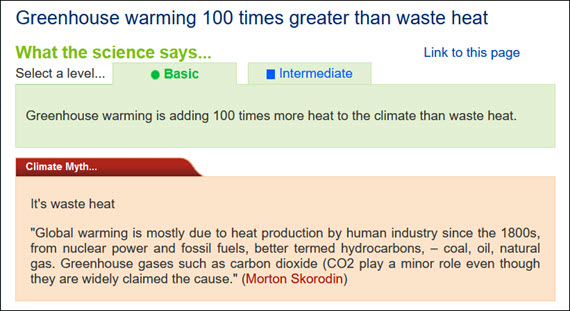
On February 14, 2023 we announced our Rebuttal Update Project. This included an ask for feedback about the added "At a glance" section in the updated basic rebuttal versions. This weekly blog post series highlights this new section of one of the updated basic rebuttal versions and serves as a "bump" for our ask. This week features "Greenhouse warming 100 times greater than waste heat". More will follow in the upcoming weeks. Please follow the Further Reading link at the bottom to read the full rebuttal and to join the discussion in the comment thread there.
There are various kinds of climate science deniers out there, but one grouping can usefully be classified under the acronym ABCD - Anything But Carbon Dioxide. These people appear to accept the climate is heating up. Flailing around to try and identify something other than CO2 causing the heating, they will seize upon all sorts of candidate causes. This is one of them. There are many others.
All the energy we use dissipates into the environment post-use, be it a driftwood fire on the beach or the heart of a busy metropolis, on the go 24-7. So it should come as no surprise that 'waste' heat does have a role - a minor one - in heating the planet. Humans have always been fond of fire since they learned to ignite things and there's nothing better than sitting round a blaze of a night with a few friends. No need to feel guilty about that. It's harmless in the overall scheme of things.
Waste heat is of course a much studied subject. After all, more sophisticated heating systems, compared to that fire on the beach, are energy-intensive and that translates as expensive. Ways to minimise heat loss and thereby improve efficiency form an active research topic. In that sense, a number of studies have looked at the bigger picture: just how much waste heat is there?
Unsurprisingly, cities, where huge numbers of people work, rest and play, are megacentres of heat wastage. The term, 'Urban Heat Island', acknowledges this. But the planet is a big old place and cities occupy relatively small parts of it. To find the warming contribution of waste heat, you need to have two figures: the total energy lost and the surface area of the planet. Doing the maths you can then derive the amount, expressed in watts per square metre. You can then compare it to other heat sources.
All studies of waste heat have arrived at a similar conclusion. There's a lot of waste heat over cities but the total, global amount, expressed as watts per square metre of the planetary surface, is a tiny fraction of the heating caused by the greenhouse gases. So while it's highly desirable to find better efficiencies in energy use and conservation, thereby saving money, when it comes to temperature it's greenhouse gas emissions we have to hold firmly in our focus. ABCD indeed. Next.
Please use this form to provide feedback about this new "At a glance" section. Read a more technical version below or dig deeper via the tabs above!
In case you'd like to explore more of our recently updated rebuttals, here are the links to all of them:
If you think that projects like these rebuttal updates are a good idea, please visit our support page to contribute!
Posted by John Mason on Tuesday, 16 January, 2024
 |
The Skeptical Science website by Skeptical Science is licensed under a Creative Commons Attribution 3.0 Unported License. |